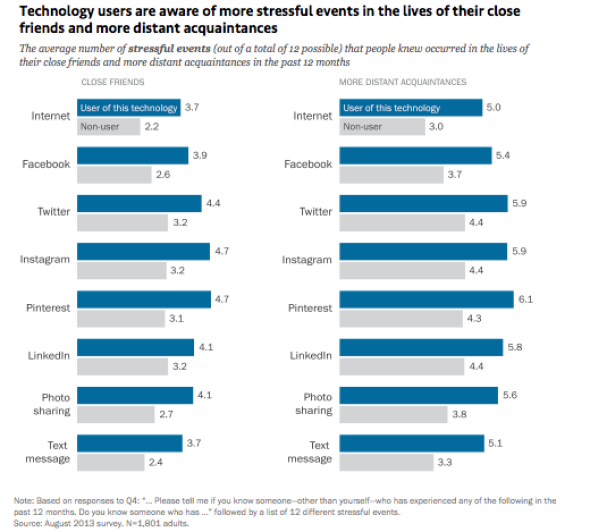People often say, “I had a stressful day.” I know I hear it enough to conclude that everyone around me is swamped. It seems like a given that all of the glowing screens and Facebook notifications around us are contributing to that anxiety. But new findings from the Pew Research Center reveal just the opposite.
In a survey of 1,801 adults, Pew found that frequent engagement with digital services wasn’t directly correlated to increased stress. Women who used social media heavily even recorded lower stress. The survey relied on the Perceived Stress Scale, a widely used stress-measurement tool developed in the early 1980s.
“We began to work fully expecting that the conventional wisdom was right, that these technologies add to stress,” said Lee Rainie, the director of Internet, science, and technology research at Pew. “So it was a real shock when [we] first looked at the data and … there was no association between technology use, especially heavy technology use, and stress.”
The survey looked at technology users and nonusers, including light and heavy users, and attempted to establish some baseline information, like the fact that people who are married or live with a partner tend to report lower stress, or the fact that women report more stress than men. From there the researchers worked to home in on stress from technology in particular. They found that social media, mobile devices, and the Internet in general didn’t contribute to increased stress for men compared with men who did not use technology. And for women who used technology, there was even some slight stress reduction.
For example, in the average-technology-use category for women (those who use Twitter several times a day, send and receive 25 emails per day, and share two photos on a mobile device per day), the study found 21 percent lower reported stress compared to women who don’t use technology. Sign me up.
It’s not all cat memes and “Gangnam Style,” though. The study did extensive analysis on the concept of the “cost of caring.” Social media allows people to keep closer tabs on most of the people they know, and just as this raises awareness of good things like promotions, marriages, vacations, and births, it also increases exposure to bad things like layoffs, hospitalizations, and crimes. These tragedies weigh heavily, and technology users are more aware of them than nonusers. Facebook is particularly good at spreading the “cost of caring.” Facebook users of both genders were aware of more bad things happening to loved ones (13 percent more aware for women, and 8 percent more aware for men).
“When we’re aware of bad things happening in the lives of our friends and family, that increases our stress,” said Keith Hampton, a researcher at Rutgers who was a leader on the Pew study. “And it just so happens that many technologies are really good at both making us aware of those types of events, and reminding us of those types of events in other people’s lives.”
In 1998, Michelle Weil and Larry Rosen, the authors of TechnoStress: Coping with Technology @Work @Home @Play, said in a press conference, “Because technology lets us do so much, today we take on too much and end up feeling overwhelmed and never finished. We feel invaded by technology on all fronts, by the beeps of our pagers, cell phones, incoming faxes and those of others around us.”
We may have fewer pagers today, but this idea that technology makes constant demands resulting in higher stress has been pervasive, and presuasive, for decades now. Pew’s findings are a refreshing departure. “A lot of the commentary on this assumes that people who don’t use technology have zero stress in their lives,” Rainie said. “But in fact stress is a chronic condition of modern life. … We’ve been trying to document the big impacts of this new media ecology on people’s lives. And there’s more to do.”
